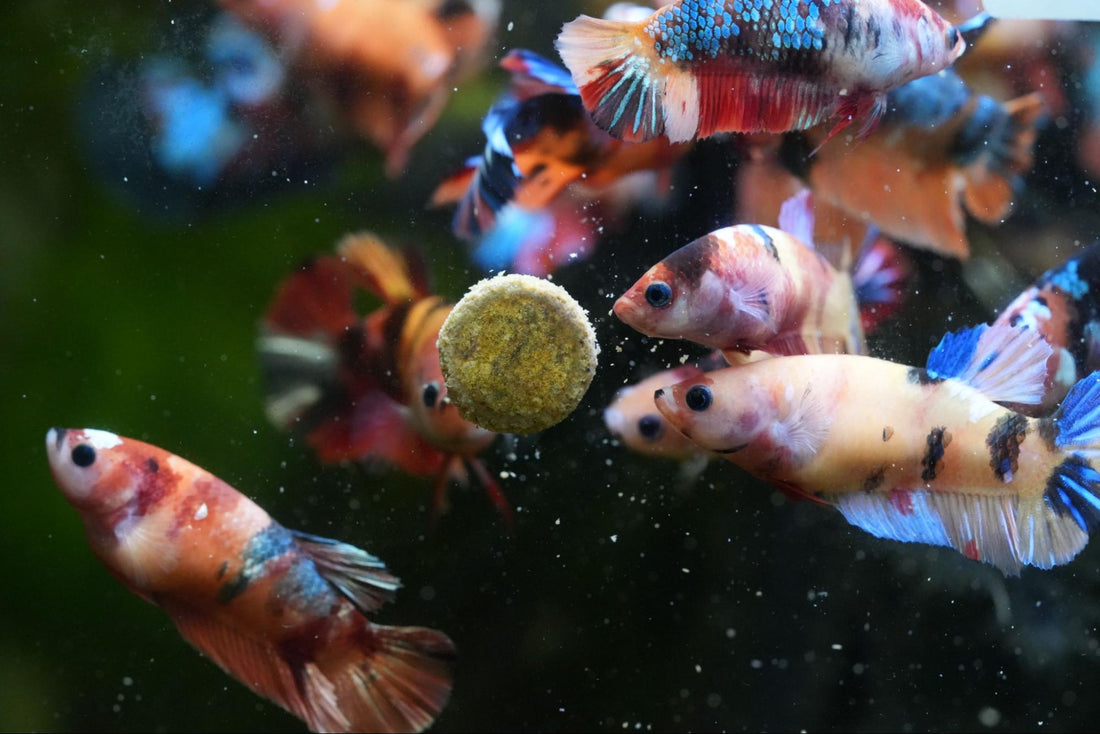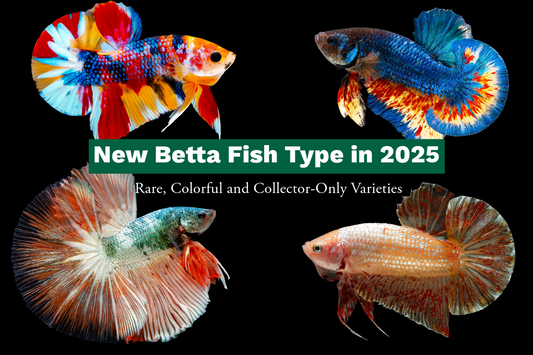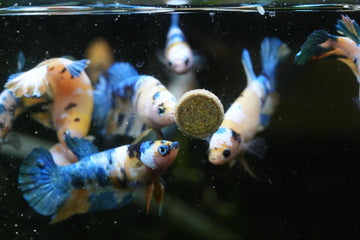They are absolutely gorgeous, do you have a orange halfmoon dumbo or are you expecting any thanks
How Often Should You Feed Your Betta Fish?

Contents
- 1- Betta Fish Dietary Needs
- 2- How Often Should You Feed a Betta Fish?
- 3- Example Betta Fish Feeding Schedules
- 4- Portion Control and Overfeeding
- 5- Feeding Baby Bettas (Fry)
- 6- Special Tips for Sick Bettas
- 7- Other Things to Keep in Mind When Feeding Your Betta
- 8- Find the Right Betta at Tropicflow
Betta fish are loved for their stunning colors and unique personalities, making them a favorite among aquarium lovers.
However, ensuring they thrive goes beyond just having a nice tank; it’s also about knowing what they need to eat.
One of the most common questions new Betta owners have is: how often should I feed my Betta fish?
In this guide, we’ll explore the best feeding practices for your Betta, how often to feed them, and tips to avoid common mistakes like overfeeding.
Betta Fish Dietary Needs
Bettas are naturally carnivorous, which means they do best on a diet that's high in protein. In the wild, these fish mainly eat insects and their larvae that they find in the shallow waters of Southeast Asia. Their digestive systems are designed to process high-protein meals, which is why feeding them typical fish flakes – usually designed for omnivores like goldfish – is not a good idea.

Instead, it’s better to give your Betta fish food that’s specifically made for them. Look for Betta pellets, or consider offering live or frozen foods that resemble what they would eat in their natural environment.
How Often Should You Feed a Betta Fish?
Bettas are stunning and lively fish that can make great pets, but keeping them healthy means feeding them the right amount at the right times.
Twice a Day Routine
For adult bettas, feeding them once a day is usually enough. You can choose to do this in the morning or at night, depending on what works best for you.
Many betta owners stick to one meal a day, giving their fish a small portion of food. However, some prefer to split it into two smaller meals to keep their bettas happy and engaged.
A typical feeding schedule might look like this:
- Once a Day: Feed 4-6 pellets in the morning.
- Twice a Day: Feed 2-3 pellets in the morning and another 2-3 pellets in the evening.
Fasting Days
It’s also a good idea to have a fasting day once a week. This helps clear out any leftover food in your betta's system, which can prevent issues like constipation. On fasting days, you simply skip feeding altogether, giving your fish’s digestive system a little break, ideally once per week.
Example Betta Fish Feeding Schedules
Creating a feeding schedule is a great way to ensure your Betta gets a balanced diet without overfeeding. Here are two sample feeding charts you could follow:
Example 1: Balanced Feeding Schedule
- Monday: Betta Pellets (Morning and Evening)
- Tuesday: Betta Pellets (Morning), Frozen Brine Shrimp (Evening)
- Wednesday: Betta Pellets (Morning and Evening)
- Thursday: Betta Pellets (Morning), Freeze-Dried Bloodworms (Evening)
- Friday: Betta Pellets (Morning and Evening)
- Saturday: Betta Pellets (Morning), Live Daphnia (Evening)
- Sunday: Fasting Day (No Food)

Example 2: Live Food Focused Schedule
- Monday: Tubifex Worms (Morning), Betta Pellets (Evening)
- Tuesday: Frozen Brine Shrimp (Morning and Evening)
- Wednesday: Betta Pellets (Morning and Evening)
- Thursday: Live Bloodworms (Morning), Betta Pellets (Evening)
- Friday: Betta Pellets (Morning and Evening)
- Saturday: Frozen Mysis Shrimp (Morning), Betta Pellets (Evening)
- Sunday: Fasting Day (No Food) .
These schedules provide a balanced mix of food types and ensure that your Betta’s digestive system remains healthy.
Tropicflow Betta Fish Food Recommendations and Where to Get Them
Feeding your betta the right food is important for keeping them healthy and vibrant. Here are some of our top picks:
- Pellets
- Hikari Betta Bio-Gold: This well-balanced pellet is packed with protein to help enhance your betta’s color and overall health—great for daily feeding.
- Hikari Vibra Bites: High in protein, these pellets help your betta develop vibrant scales and bring out their natural colors.
- Mixed Food
- Ultra Fresh Betta Fish Food: Our staff’s favorite for a balanced diet that also helps keep the water cleaner, meaning less tank maintenance for you.
- Frozen Food
- Frozen Bloodworms: A popular treat for bettas, these bloodworms are great for boosting nutrition and keeping your fish healthy.
- Hikari Frozen Bloodworms: Another excellent choice, packed with nutrients to add variety to your betta’s diet.
These foods will help keep your betta healthy, enhance their color, and give them a tasty treat!
Portion Control and Overfeeding
Bettas can easily overeat, leading to health problems.
How Much Food is Enough?
Because of their tiny stomachs, Bettas don’t need large quantities of food. Overfeeding can lead to a variety of health problems such as constipation, bloating, and swim bladder disorder.
The general rule of thumb is to feed your Betta a portion of food no larger than its eye. But keep in mind that some foods expand when they get wet, so a small amount of dry food can turn into too much once it swells up in the water.

As a rough guide, you should feed your betta around 1.8 grams of food per day. That works out to about 4-6 pellets, depending on their size and the type of food you're using.
Observing your fish's reaction to food can help you determine the right amount.
How to Avoid Overfeeding?
As mentioned before, a betta's stomach is about the same size as its eye, so it's really important not to overfeed them.
One of the biggest mistakes betta owners make is giving their fish too much food. This often happens because they either don't know how much a betta should eat or they think their betta is always hungry, even when it’s not.
Overfeeding can cause a bunch of health problems, such as:
- Constipation
- Swim bladder disorder
- Obesity
- Poor water quality from leftover food
If you notice leftover food after feeding time, try giving them a smaller portion next time. Keeping an eye on your betta’s behavior and body condition will help you figure out the right amount to feed them.

Signs of Overfeeding
If you’re worried that you might be overfeeding your betta, look out for these signs:
- Bloating
- Trouble swimming
- Lethargy (not moving much)
- Hanging out at the bottom of the tank
- Floating at the surface
If you see any of these symptoms, cut back on their food right away and think about having a fasting day. You might also want to add some fiber-rich foods, like daphnia, to help with bloating and constipation.
Feeding Baby Bettas (Fry)
Feeding baby bettas, or fry, is a bit different from feeding adult bettas. You should give them small amounts of food 4 to 5 times a day. The best options are live baby brine shrimp or specially made fry food, as these provide the nutrients they need for quick growth.
As the fry get older, you can start to reduce the number of feedings and increase the size of the food.
Special Tips for Sick Bettas
If your betta is recovering from an illness or just doesn’t seem interested in food, try offering live foods like bloodworms or mosquito larvae. These high-protein, natural options can be more appealing to a picky or sick betta.
However, if your betta doesn’t eat for more than a few days, it’s a good idea to reach out to a veterinarian or a fish health specialist for advice.
Foods You Should Avoid Fee
Other Things to Keep in Mind When Feeding Your Betta
There are a few other factors that can affect how much and how often you should feed your betta:
- Bettas in bigger tanks may need more food to keep their energy up.
- Bettas have a faster metabolism in warmer water, so they may need to eat more often.
- Baby bettas have a higher metabolism than adults, so they may need more frequent feedings.
- Underweight bettas might need a little extra food, while overweight ones should get less.
- More active bettas burn more calories, so they may need bigger portions.
- Different foods have different nutritional values, which could mean adjusting portion sizes.
- Some bettas are just bigger eaters than others, so you may need to be extra careful about portion control to avoid overfeeding them.
Find the Right Betta at Tropicflow
To keep your Betta happy and healthy, sticking to a good feeding routine is key. And if you're on the hunt for a beautiful, lively Betta to brighten up your tank, Tropicflow’s got you covered.

With our 100% Live Arrival Guarantee, Tropicflow ensures that every Betta arrives in perfect health, ready to flourish in its new home.











comment